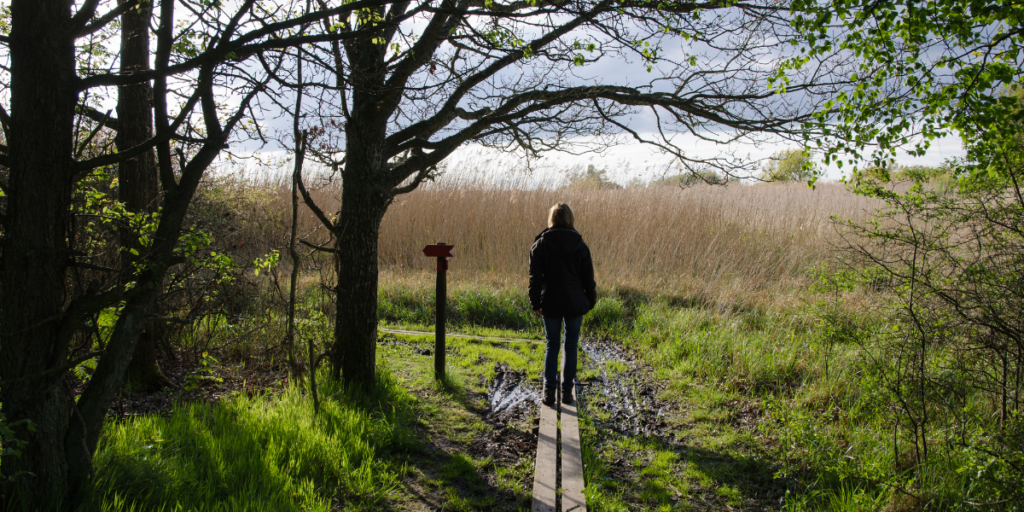With national lockdown restrictions easing and many individuals returning to work and resuming their day-to-day activities, we are reminding the community of the importance of keeping active and spending time in nature.
Until recently, being outside in green spaces has been one of the only means to resume social contact and keep physically active. For many, regular walks have been a positive way to break up the day as well as an opportunity to get out of the house. Spending time in nature has also helped with their physical health and supported general wellbeing with mental health issues including anxiety and depression.
“Getting out on walks really helps me and my own mental health. I love the feeling I get by observing nature and changes in my own neighbourhood. I get to feel like an adventurer and explorer which is a powerful feeling.”
Francesca Moll, Walking for Wellbeing Project Facilitator at Oxfordshire Mind
Nature helps to reduce stress
There is a strong link between physical activity and its ability to help reduce stress levels. Most forms of exercise can release built up anxiety or negative emotions. It can also support people experiencing sleeping difficulties caused by stress, as it can help to sleep quicker and improve the quality of sleep. Being outside in natural light is also extremely helpful for those who experience seasonal affective disorder (SAD), which is a type of depression that affects people during seasons or times of the year such as winter.
Being outdoors can improving self-esteem
Being outdoors can offer a distraction from busy workloads, by not only allowing people to decompress from daily stresses but by also helping to raise their self-esteem and other negative feelings associated with other responsibilities. Nature can inspire positive feelings that help to better connect us with inner thoughts and our environment. A walk or a picnic with a friend or family member can also be therapeutic towards forming stronger connections and encourage meaningful conversations to discuss any issues.
Nature supports relaxation and mindfulness
Taking the time to reflect on thoughts by focusing on your body and environment forms a major part to many relaxation methods and mindfulness practices such as yoga and meditation. Being surrounded by bright and colourful scenery has also proven to increase feelings of compassion and empathy towards oneself and others. Natural elements such as water, plants and the sun, can often provide support when coping with pain by pleasing senses including hearing, smell, sight and touch.
It is a great way to enhancing creativity
Exposure to nature can also help to feed creativity as a change of scenery can help to change perspective by offering a variety of new visual experiences. With the growing number of distractions from our screens and the use of social media, attention levels are becoming increasingly low and sticking to tasks or forming new ideas can be difficult. Taking a walk outdoors can provide a respite for overactive minds and help to refresh our thoughts for new tasks, helping to refocus and offer new creative ideas.
We understand that many individuals with mental health problems may face barriers that might stop them wanting to connect with nature. They might experience discomfort being in unfamiliar spaces, get tired easily, feel unmotivated or might be worried about being around other people. If you might be feeling either of the above, we have also shared things to consider when trying to overcome these barriers.
Take small steps
Try spending short amounts of time in nature to begin with. If you have access to a garden or a green space outside your home, try spending five minutes a day to notice the grass, looking up at the sky and listening to the sounds around you.
Do things you enjoy
You might enjoy reading books, writing, or listening to music. Try to plan these activities into the time you spend in nature to get comfortable being outside.
Ask for support
If you feel nervous about going outside alone, try asking someone you trust to accompany you at first. Think about joining an online walking group or community that can help you feel more comfortable where you can meet with like-minded people.
Take it easy
If you are not feeling particularly social or energised, try not to be too hard on yourself and wait until you are feeling more comfortable with the idea of going outdoors. If you take medication and experience side effects, think about times of the day that might better suit you to avoid the possibility of any injuries.
We run Walking for Wellbeing groups for those with experience of severe and enduring mental health issues based in Oxford and Banbury.
“Meeting other likeminded people who suffer with similar traits as I do. I enjoy the company of these welcoming people including Francesca our guide from Oxfordshire Mind. It is a relaxed and happy atmosphere; this is the only time in the week where I get to mix with others whilst enjoying the great outdoors and exercising. It is truly the one thing I look forward to all week. I get very tense and anxious all week, and this is my opportunity to release these feelings and actually feel happy”.
Oxfordshire Mind service user
If you are unable to attend the Walking for Wellbeing walks, the charity also hosts virtual walking experiences, which offer a sensory description of a walk around a picturesque location, with pictures and an audio recording to help transport you to that place.
Locations include the South African Savannah, the Himalayas, and Caribbean Islands! You can access the virtual walks by visiting the website here.
If you still have concerns or are experiencing issues with your mental health and would prefer to speak to a staff member at Oxfordshire Mind, please contact the Information Service for advice, signposting and support.
The Information Service is open on Monday to Friday, 9.30am to 4pm and can be reached on 01865 247788 or by text on 07451 277973 and by email at [email protected]


